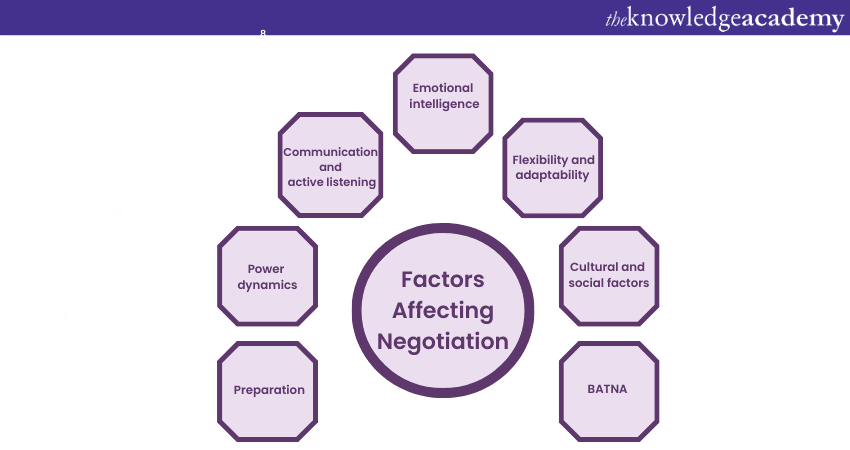We may not have the course you’re looking for. If you enquire or give us a call on + 1-866 272 8822 and speak to our training experts, we may still be able to help with your training requirements.
Training Outcomes Within Your Budget!
We ensure quality, budget-alignment, and timely delivery by our expert instructors.

Negotiation plays a crucial role in various aspects of our personal and professional lives. Whether it's securing a business deal, resolving conflicts, or even discussing personal matters, effective Negotiation skills are essential. However, Negotiations are not just about persuasive arguments and strong communication; they are influenced by several factors that can significantly impact the outcome. Further, in this blog, we will explore seven important Factors Affecting Negotiation and gain a comprehensive understanding of their significance.
Table of Contents
1) What are the Factors Affecting Negotiation?
a) Preparation
b) Power dynamics
c) Communication and active listening
d) Emotional intelligence
e) Flexibility and adaptability
f) Cultural and social factors
g) BATNA (Best Alternative To a Negotiated Agreement)
2) Conclusion
What are the Factors Affecting Negotiation?
This section of the blog will expand on the various Factors Affecting Negotiation process.

Preparation
Successful Negotiation begins long before the actual discussion takes place. Adequate preparation is vital for achieving favourable outcomes. Researching the subject matter, understanding the opposing party's position, and setting clear objectives are crucial steps in effective preparation for Negotiation. The more prepared you are, the more confident and better equipped you will be during the Negotiation process.
Power dynamics
Power dynamics play a significant role in Negotiations. Understanding who holds power and how it can be leveraged is essential. Power can be derived from various sources, such as expertise, authority, information, or resources. Recognising the power dynamics at play allows negotiators to adapt their strategies accordingly, ensuring a fair and balanced Negotiation process.
Communication and active listening
Effective communication is at the heart of successful Negotiations. Expressing ideas clearly, using persuasive language, and maintaining a respectful tone are essential skills. Moreover, active listening is equally important. By attentively listening to the other party's concerns, needs, and perspectives, negotiators can build rapport, gain valuable insights, and find common ground. Strong communication and active listening foster trust and facilitate a collaborative Negotiation environment.
Emotional intelligence
Emotional intelligence plays a vital role in Negotiations. Being aware of one's emotions and managing them effectively, as well as understanding the emotions of others, enables negotiators to navigate through challenging situations. Emotional intelligence helps in building empathy, defusing tensions, and finding mutually beneficial solutions. By considering and addressing the emotional aspects of Negotiation, better outcomes can be achieved.
Flexibility and adaptability
Negotiations rarely follow a linear path, and unexpected challenges may arise. Being flexible and adaptable to changing circumstances is crucial. It involves being open to alternative solutions, adjusting strategies, and finding creative compromises. Flexibility allows negotiators to overcome obstacles and maintain progress towards reaching a mutually satisfactory agreement.
Elevate your sales game and master the art of Negotiation with our Sales Negotiation Skills Course!
Cultural and social factors
Negotiations often involve parties from diverse cultural and social backgrounds. Understanding and respecting these differences is essential for effective Negotiation. Cultural norms, values, communication styles, and decision-making processes can significantly impact Negotiation dynamics. Being aware of and adapting to these cultural and social factors fosters mutual understanding and increases the likelihood of successful Negotiations.
BATNA (Best Alternative To a Negotiated Agreement)
The BATNA concept refers to the alternative course of action a negotiator can take if an agreement cannot be reached. Having a strong BATNA provides an advantage during Negotiations and increases the negotiator's confidence. Understanding your BATNA and evaluating the opposing party's BATNA negotiation helps in assessing the relative strength of your Negotiation position. A solid BATNA empowers negotiators to make the right decisions and negotiate from a position of strength.
Refine your assertiveness and excel in communication with our Assertiveness Skills Training!
Conclusion
Negotiation is a complex process influenced by various factors. By understanding and considering the aforementioned seven important Factors Affecting Negotiation, negotiators can enhance their effectiveness and achieve more favourable outcomes. Developing a comprehensive understanding of these factors empowers negotiators to navigate through Negotiations with confidence and finesse.
Unlock your communication potential and excel in your professional and personal life with our comprehensive Communication Skills Training Courses!
Frequently Asked Questions
Upcoming Business Skills Resources Batches & Dates
Date
 Public Speaking Course
Public Speaking Course
Fri 20th Dec 2024
Fri 17th Jan 2025
Fri 21st Feb 2025
Fri 4th Apr 2025
Fri 6th Jun 2025
Fri 19th Sep 2025
Fri 26th Dec 2025







 Top Rated Course
Top Rated Course



 If you wish to make any changes to your course, please
If you wish to make any changes to your course, please


